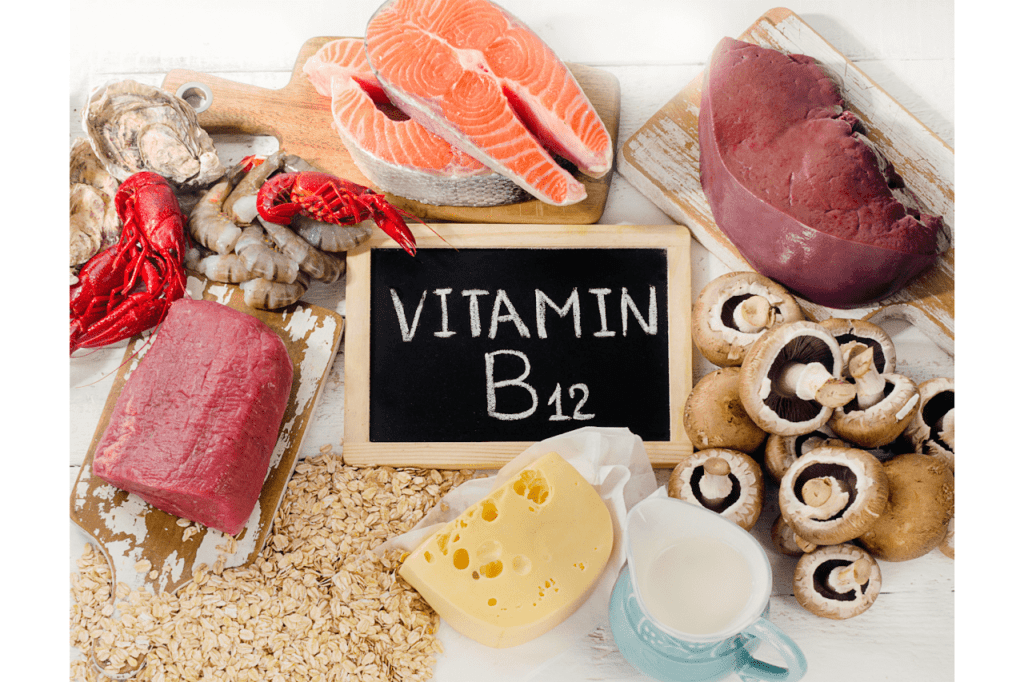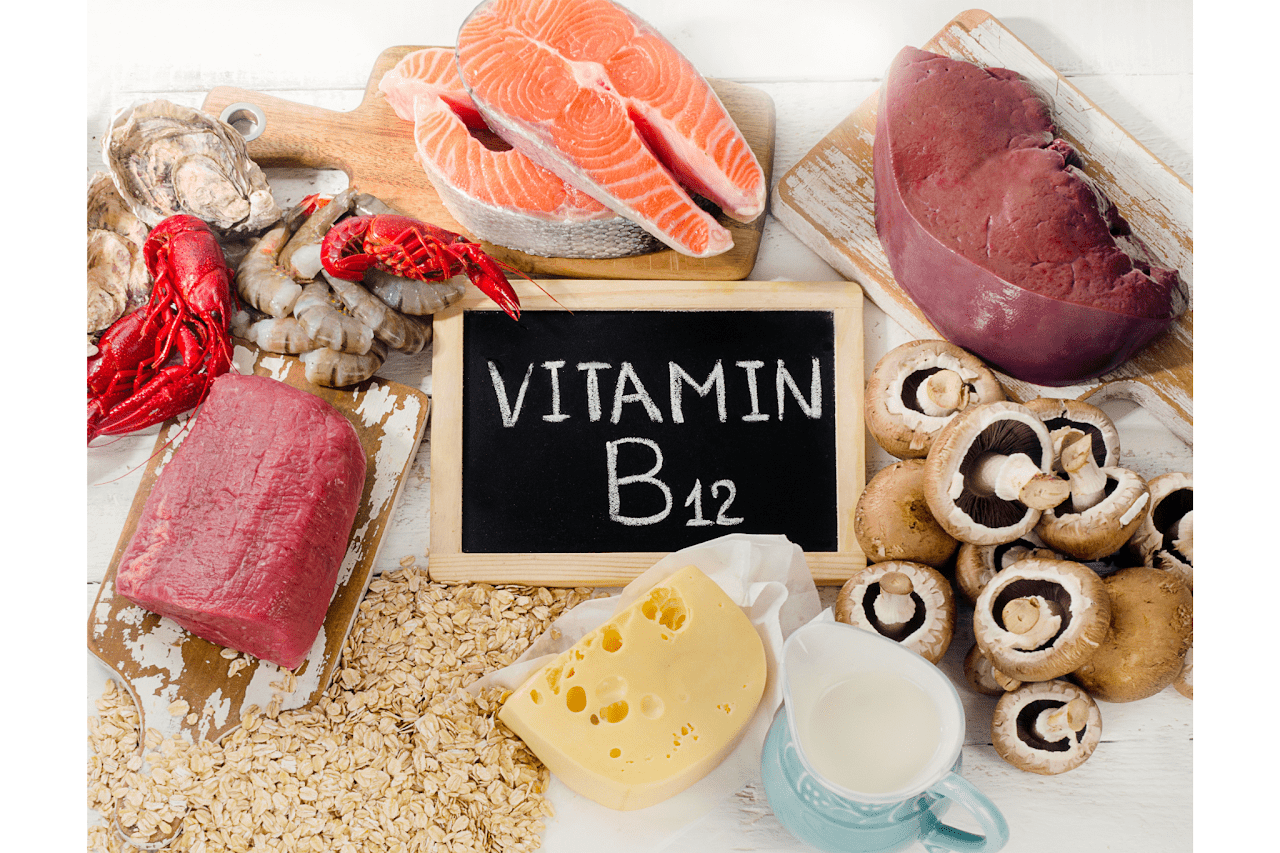Vitamin B12: Exploring Its Crucial Role in Health and Well-Being
Preventing Deficiency: Strategies for Ensuring a Sufficient Vitamin B12 Intake in Vegetarian and Vegan Lifestyles
Vitamin B12, also known as cobalamin (including forms like cyanocobalamin and methylcobalamin), is a water-soluble vitamin that plays a vital role in human metabolism. Since it’s one of the eight B vitamins, it is also known as the B complex because they are all Vitamin B with different numbers. It is found in many food sources, such as liver, kidneys, fish, dairy products, and eggs, but plant-based foods do not contain Vitamin B12 in sufficient quantity. Although B12 deficiency is not prevalent in the Western world, it is found that strictly vegetarian people may suffer from its deficiency. However, vegetarians can control B12 deficiency using fortified foods like cereals and soy milk. Also, elderly people with digestive problems are prone to its deficiency because of poor B12 absorption of nutrients.
What is Vitamin B12?
Vitamin B12 is an essential nutrient that plays a crucial role in metabolism and general health. It is naturally found in vitamin B12 foods like fish, meat, dairy, eggs, salmon, beef, lamb, tuna, clams, sardines, and trout, but it’s not found in any significant amount of plant foods like vegetables, beans, and grains. This is the reason for its deficiency among people who avoid these foods, especially those on vegetarian or vegan diets. However, it is readily available in most multivitamins and fortifiedfoods like breakfast cereals.
Vitamin B12 is a water-soluble vitamin, which means that it dissolves in water and is not stored in the body like fat-soluble vitamins like Vitamin A and Vitamin D. Due to this, Vitamin B12 needs to be a part of the diet every day, with the recommended daily amount being a few micrograms. However, unlike other water-soluble vitamins, it is stored in the liver in a type of cell called “cytosol.” The human body usually doesn’t need to replace it daily. The body can store it up later when it doesn’t consume enough.Preventing Deficiency: Strategies for Ensuring a Sufficient Vitamin B12 Intake in Vegetarian and Vegan Lifestyles

Importance for human health
Vitamin B12 is essential for the functioning of the central nervous system, DNA synthesis, red blood cell formation, and proper breakdown of proteins and fats. B12 deficiency can also cause or worsen certain mental disorders, such as paranoia, memory loss, and dementia. Furthermore, its deficiency can also lead to or exacerbate other diseases or conditions, such as pernicious anemia, certain types of cancers, and heart disease.
Benefits for health
Mood and mental health – One of the first B12 deficiency symptoms is often mental health issues such as anxiety, depression, and other mood disorders. These can happen when your body lacks the neurotransmitters to keep you happy, focused, and motivated.
Dementia – A deficiency of Vitamin B12 has been found to contribute to developing dementia and low cognitive function. However, there is no evidence to suggest that its supplements can treat or revert dementia.
Heart health—It is also essential to a healthy cardiovascular system. It helps to make red blood cells, which carry oxygen throughout the body, including vital organs like the heart.
Protein metabolism—Proper protein breakdown is necessary for the body to function properly. This can be especially important for vegetarians and vegans, who avoid animal protein sources of vitamin B12.
Immune health—One of the first symptoms of its deficiency is a weak immune system. This can result in infections or sickness, such as a common cold.
Neurological health – One of the essential organs affected by its deficiency is the brain. A lack of Vitamin B12 can decrease the formation of myelin, a fatty substance that coats and protects the nerves in the brain and spinal cord. This can worsen symptoms of neurological disorders, such as multiple sclerosis.
Sources for vegan or vegetarian
There is limited choice for vegetarian B12 sources and vegan B12 sources for sufficient quantity. However, vegetarians can get B12 for vegans from the following sources:
Breakfast cereal – Cereal is an excellent source of Vitamin B12. If you choose carefully, you can also get your recommended daily allowance of iron, fiber, and other beneficial nutrients from cereal.
Nutritional yeast—Nutritional yeast is commonly found in vegan recipes. Some types are fortified with it, making them an excellent plant-based B12 source.
Fortified soy milk – Soy milk is fortified with B12 in many countries, including the United States. Other plant-based milks, like almond milk, may also be fortified with B12.
How to get enough vitamin B12
Take a multivitamin – Many multivitamins contain Vitamin B12 in forms like cyanocobalamin or methylcobalamin, as well as other nutrients often lacking in a vegan or vegetarian diet. B12 supplements are also essential for vegetarian women during pregnancy or breastfeeding.
Combine your best food sources – You can also get your daily recommended amount of a few micrograms of Vitamin B12 by combining your best food sources. For instance, you can add a teaspoon of nutritional yeast to a bowl of fortified cereal and a glass of soy milk for a well-rounded breakfast full of B12.
B12 injections—In some cases of severe deficiency or absorption issues, a doctor may recommend B12 injections to quickly boost levels. Sublingual B12 supplements that dissolve under the tongue are another option for better absorption.
Side effects
Vitamin B12 supplements are generally safe. The excess amount passes through urine since the body absorbs only as much as it requires. Its high doses of several hundred micrograms may, however, cause the following:
- Nausea and vomiting
- Diarrhea
- Headache
- Tingling sensation in hands and feet
Interaction
Taking vitamin C supplements with vitamin B12 might reduce your body’s available amount of vitamin B12. Vitamin C should be taken a few hours after taking vitamin B12 supplements to avoid this interaction.
Some drugs used to treat inflammation, diabetes, and digestive problems are likely to decrease the body’s ability to absorb vitamin B12 by impacting intrinsic factors.
A doctor should be consulted to seek advice on its possible interaction with other medications and to interpret the results of a B12 blood test.
In conclusion, vitamin B12 is essential for mental and physical health, especially for those following vegetarian or vegan diets who may lack B12-rich animal foods. Careful planning to include B12-fortified foods, supplements, and potential injections can help prevent B12 deficiency.
You may also like to read:
Boost Brain Health: Diets That Protect Both Heart and Mind
Category
- Health Issues (72)
- Healthy Diet (48)
- Herbs for Health (11)
- Mental Health (33)
- Skin Care (20)

